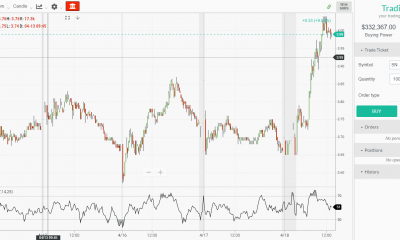Economy
The State Owns You: The Problem with "National Service"

Following the Trump administration’s decision to assassinate General Soleimani earlier this month, many Americans began to fear that war between the United States and Iran was imminent. Tensions rose as the president and the Iranians rattled their sabers and taunted each other on social media.
Google searches for “Is there going to be a draft?” shot up 900 percent in just one day. The official website of the Selective Service—the federal agency tasked with carrying out the draft—received so much traffic that it eventually crashed.
Thankfully, the risk of impending war seems to have largely abated. But the short-lived crisis poses two interesting questions—questions we ought to answer before another potential war appears on the horizon: would the government consider imposing conscription and, if it did, would it be morally justifiable?
Prospects for the Draft
There is little doubt that, should the opportunity arise, major politicians from both parties would happily bring back the military draft. As recently as 2003, Democratic congressman Charlie Rangel introduced legislation to reinstate the draft. Indeed, many would like to bring it back right now. President Trump, for example, on the campaign trail in 2016 promised to restore conscription as a way to “make the military great again.”
Some would like to conscript the youth not just for war, but also for domestic purposes such as cleaning up the environment and assisting the elderly. Once again Congressman Rangel led the charge, proposing legislation in 2013 to require all persons living in the United States “between the ages of 18 and 25 to perform a 2-year period of national service, unless exempted, either through military service or through civilian service.” The bill died before it could be voted on, but the movement for mandatory service lives on.
Just last year, presidential candidate Pete Buttigieg introduced a plan to massively expand the number of positions for national service programs as well as increase their funding. For the moment, Buttigieg says that the government would only recruit volunteers, but he has admitted that he’s open to making national service “legally obligatory.”
Justifiable Slavery?
Whether the argument is utilitarian or made as an appeal to some vague notion of “patriotic duty,” all arguments in favor of mandatory service rest on the idea that an individual’s life belongs not to him- or herself, but to the state. And the state may at its leisure order millions of people, under threat of violence, to carry out virtually any task, whether it be taking up arms against total strangers or picking up trash at the local park. That such tasks may be good and necessary does not logically entail that enslaving people to perform them is morally justifiable.
Modern proponents of conscription seldom address this moral quandary (they would not dare openly admit to wanting to be slave drivers). They prefer instead to scorn those opposed to the draft as outrageously selfish. In a piece defending the merits of a draft, author and former Marine Jeff Groom asks rhetorically, “Do people today no longer need to give up anything for their country?” It is a strange question, given that the military draft literally asks people to give up everything, i.e., their freedom and quite possibly their lives. But Groom asserts that those darned kids today would not be willing to sacrifice so much as their smartphones if their country required it. The youth are just too entitled. (One genuinely wonders if today’s youth actually have any greater sense of entitlement than the generations who supported FDR’s New Deal in the 1930s and ushered in the Great Society massive welfare programs in the ’60s.)
Generational squabbling aside, Groom does bring up an interesting point—albeit one that proponents of the draft have brought up many times before. He argues that the government would show more restraint in choosing when to initiate military action if politicians and voters knew that their children—or even themselves—might be called into service.
But even if the draft was effective at discouraging reckless warmongering, it would leave the fundamental moral question unanswered: does the government have the right to temporarily enslave its citizens, however important or advantageous the purpose may be? It is not a question that Groom, or most other conscription supporters, for that matter, have come close to addressing.
That’s unfortunate, because it may very well be true that military service and volunteer work offer many valuable benefits, both to the individuals who take part in them and to the nation at large. However, supporters of the draft routinely make the logical leap from recognizing the collective benefits of national service to asserting a moral authority to use force without ever demonstrating how it is that the government came to possess such an authority.
Rather than attempt to persuade people that they ought to join the military or sign up for community service, the first instinct of draft supporters is to use coercion. Instead of treating their fellow citizens with respect and dignity, they would prefer to direct their lives at the point of a gun.
In the 1950s, President Dwight D. Eisenhower proposed implementing a peacetime draft in order to shore up America’s military readiness. He declared that “a soldier’s pack is not so heavy a burden as a prisoner’s chains.” Eisenhower apparently did not consider that they might be one and the same.
Economy
Impeachment – Democrats & Point of No Return
COMMENT: Dear Martin,
I consider myself a “political atheist and have the habit of informing myself by following a wide variety of quality news sources (from a variety of countries ) across the political spectrum and think thus getting a good idea of what’s going on in the USA at this point.
..
I have been following you and your writings for several years now and recently resubscribed to Socrates but must admit being very surprised by your current updates with respect to the trump impeachment and how the democrats are responsible for the total destruction of the American democracy.
I cannot understand your position and point of view cause there’s no doubt the republicans are a totally corrupt bunch who will stop at nothing to ensure their leader will remain in place regardless of the clear authoritarian rule he is out to establish.
TS
ANSWER: Perhaps I was too short. The point is not that the Republicans are better than the Democrats. The point I am making here is that politics is always about precedent. What the Democrats have done changes the game. When the cycle shifts and the Republicans are on the other side of the table, then they will see themselves as justified in using the same tactics.
This is what I mean by saying the Democrats have destroyed the very power of Impeachment. I do not believe that what Trump did warrants impeachment any more than what Clinton did. The Impeachment Power has to be about upholding the Constitution.
What the Democrats did to Kavanaugh was outrageous. Allowing unproven accusations from 30 or 40 years before to be made in Congress has NOTHING to do with the veracity of those statements, the character of Kavanaugh himself, but about the process. I have mentioned I knew Steve Moore who Trump wanted to nominate for the board of the Federal Reserve. Immediately, the Democrats began to attack him. He withdrew his name because he has a family. What the Democrats have done is changed the rules of the game to such an extent, I know good qualified people who are no longer willing to serve in any capacity in government. This has become a grudge match.
So do not take my comments as supporting Trump or Republicans v Democrats. This is the collapse of CIVILITY and that is what is destroying government. The Democrats are out of control. There is NOTHING to be gained by this tactic. Even if they won the White House, do you really think the Republicans will then not do the very same to them?
This is what I mean the government has ceased to function. There is NO GOING BACK!!!!! We have crossed the Point of No Return!!!!!
Economy
Online Reading Groups
On three Tuesday afternoons last month, I was privileged to enjoy a thoughtful, engaging, and content-rich discussion with several people I’ve never met in real life.
It was Econlib’s first-ever VRG (Virtual Reading Group) in which we discussed Deirdre McCloskey’s latest, Why Liberalism Works. The three hours flew by, and left me wishing we had more time together. This is a new type of program for us, and we’re super happy with the results thus far. In fact, we’ve already scheduled our next VRG.
Starting Wednesday, March 11, we will meet virtually from noon to 1pm EST for three consecutive weeks to discuss a side-by-side reading of G.A. Cohen’s “Why Not Socialism?” and Jason Brennan’s “Why Not Capitalism?” Sessions are one hour each, and conducted via Zoom. Participants who successfully complete all three sessions will receive a $20 Amazon e-gift card after the group concludes. The schedule of readings is as follows:
- March 11: Cohen, pages 3-45 and Brennan, pages 3-46
- March 18: Cohen, pages 46-79 and Brennan, pages 47-69
- March 25: Brennan, pages 70-99
If you’re not up to a live conversation (or our schedule doesn’t jive with yous), we hope you’ll consider weighing in on twitter or in our Facebook #EconlibReads group as we start our discussion of The Mandibles on Monday. In the first week, we’ll be talking about Part 1, chapters 1-5. In week two, we’ll discuss Part 1, chapters 6-10. Week three will deal with Part 1, chapters 11-14, and in our final week, we’ll turn to Part 2.
And if all of the above still isn’t enough, there’s still time to join the February VRG hosted by our sister site, AdamSmithWorks. This VRG meets for four sessions, beginning Thuursday, February 13 from 4-5pm EST. Participants will read and discuss selections from Smith’s Theory of Moral Sentiments, his lectures on rhetoric, and Jane Austen’s Persuasion. As with the Econlib VRG, participants who successfully complete all four sessions will receive a $20 Amazon e-gift certificate. You can find more information, including the schedule of readings, here.
We hope to “see” you in one- or all- of these conversations!
As an Amazon Affiliate, Econlib earns from qualifying purchases.
(0 COMMENTS)
Source link
Economy
The National Drive for Rent Control
Everyone wants affordable housing, but how far will they go to attain it?
For some, housing affordability is such a pressing issue that they will entrust politicians with the duty of providing it through legislation. Rent control is one of the oldest tricks politicians can pull out of their magic hats to demonstrate to the public that they’re getting to the bottom of the housing affordability crisis.
At its core, rent control consists of a government-imposed ceiling on residential rental rates within a given jurisdiction. Thirty-seven states in the country preempt or prohibit rent control. On the other hand, states like New Jersey, Maryland, California, Oregon, and New York have localities that permit some form of residential rent control. However, the latter three states pushed the legislative envelope last year.
States like Oregon became trendsetters by passing statewide rent control legislation which restricts annual rent increases to 7 percent plus inflation. Other states such as New York and California passed similar pieces of legislation that limit the ability of landowners to raise rents on their tenants. Oregon’s passage of statewide rent control may have been the straw that broke the camel’s back in terms of putting interventionist housing policies on the national spotlight.
Even federal politicians and 2020 presidential aspirants are catching on to the rent control mania. Vermont senator Bernie Sanders and Congresswoman Alexandria Ocasio-Cortez have offered their two cents on rent control. Sanders stated,
Landlords cannot be allowed to raise rents to whatever they want, whenever they want. We need national rent control.
Ocasio-Cortez echoed Sanders’ sentiments, declaring that
It’s time that we stop commodifying the housing market because it is not a speculative investment, it is a basic right for all Americans.
The rent control enthusiasm we’re seeing is not occurring in a vacuum. People are clearly incensed with their local governments. After all, congested streets and highways and a high cost of living have made many city dwellers perpetually frantic. Frustrations aside, hastily falling for a politician’s demagogic proposals only invites lower living standards for all. Rent control is the embodiment of “too good to be true” legislation that mesmerizes the politically disenchanted at first but makes them even more frustrated once the consequences of these policies set in.
Understanding Rent Control
Rent control legislation establishes price ceilings that artificially boost demand for housing. If the government-imposed ceiling falls below market rental rates, shortages will start to pop up as the demand exceeds the current housing supply. This is a question of basic economics. More perverse are some of the other unintended consequences. Rent control essentially redistributes wealth to current tenants at the expense of future tenants and those who pay market-rate rents. Those living in rent-controlled units usually benefit at the expense of those who do not. Furthermore, rent control leads to the deterioration of housing units due to owners having less of an incentive to spend their money on apartment upkeep. In normal, market-rate units, owners would have sufficient revenues to maintain the apartments and add improvements. Swedish economist Assar Lindbeck did not mince words when he asserted that
In many cases rent control appears to be the most efficient technique presently known to destroy a city—except for bombing.
A Free Market Solution Must Be Offered
The housing affordability crisis that many cities in America are facing is no joke. To put it in perspective, real housing prices increased twofold in New York City and Los Angeles and tripled in San Francisco in 1970. For nearly a fourth of renters nationwide, housing accounts for half of their spending. With this in mind, we should still exercise prudence when trying to analyze why rents are so out of control in these cities. The rising rents we see aren’t the end result of the machinations of greedy landlords. The dirty secret that big-city politicians don’t want their constituents to find out is that rising rents are the result of interventionist public policies, namely land-use regulations that constrict the overall supply of housing.
Just looking at land-use regulations in California and Oregon should give us an idea of how badly government policies are asphyxiating the housing market. According to the Cato Institute’s Freedom in the 50 States Index, California and Oregon are ranked forty-seventh and forty-third in terms of land-use freedom, respectively. Oregon’s dismal ranking is justified when looking at how its land-use policies have impacted development.
The Wall Street Journal editorial staff observed that Oregon’s restrictive zoning and land-use mandates have generated the lowest rate of residential construction in decades. Between 2010 and 2019, Oregon grew by four hundred thousand people. However, the state added only thirty-seven housing permits per one hundred new residents based on a report from the Oregon Office of Economic Analysis.
Economist Josh Lehner correctly noted that people who are only looking at rising housing costs are paying attention to “the symptom and not the cause of the disease.” In Lehner’s view, “the chief underlying cause is the ongoing low levels of new construction this decade.” Lehner added that
on a population growth-adjusted basis, Oregon built fewer new housing units this decade than we have since at least World War II.
Like rent control, these questions of housing prices boil down to the basics. When the supply of housing stock is artificially restricted thanks to legislation, we inevitably get more expensive housing. However, it is not sufficient to say “let the market handle it” when trying to offer an alternative policy to rent control.
There’s plenty of government intervention that impedes market mechanisms from providing affordable housing. Instead, we must point to specific policies, such as zoning rules, that make it more difficult to build housing. These regulations are the main culprits behind these rising housing prices. To win this debate, free market proponents must offer the solution of land-use liberalization, which entails repealing these measures.
Are We Still Stuck on Interventionist Canards?
The lack of insight into how to solve housing problems is the product of a mindset that treats housing as a positive right. Similar to other services such as education, many political busybodies view housing as a “right” and thus compel the state to step in and provision it.
Blinded by their zeal to save the masses from the “excesses” of greedy landlords, politicians ignore the regulatory state in the background. Like its education counterpart, the housing market has provided housing for decades without issue. But for these markets to actually work, a genuine effort to roll back arbitrary rules and regulations has to take place. This may be too much to ask for from political chattering classes who insist that their political programs will help the common man.
Nonsolutions like rent control are the go-to options for politicians who desperately scour their precincts for votes. Tragically, their constituents end up paying the price once the predictable economic distortions begin to materialize. By the time the damage is done, the political do-gooders will likely be out of office, to be replaced by another set of demagogues who will blame the market yet again for the failures that regulation caused in the first place. Some facts never seem to register with society’s most “enlightened.”
And that’s how a vicious cycle of never-ending regulation commences.
-

 Finance4 months ago
Finance4 months agoBest Mortgage Rates
-

 Share Market4 months ago
Share Market4 months ago2 Simple Ultimate Oscillator Trading Strategies
-
Finance3 months ago
20 Gifts for Boys Under $30
-

 Economy4 months ago
Economy4 months agoWhat If Tariffs Cost Trump The Farm Vote?
-
Marketing Strategies3 months ago
The Beginner's Guide to LinkedIn Marketing
-

 Share Market3 months ago
Share Market3 months agoThe Streaming Wars Enter Their Second Act
-

 Finance2 months ago
Finance2 months agoBest Cheap Life Insurance for 2020
-

 Finance4 months ago
Finance4 months agoThe Honest Truth About Van Dwelling: Answers To The Most Common Van Life Questions

